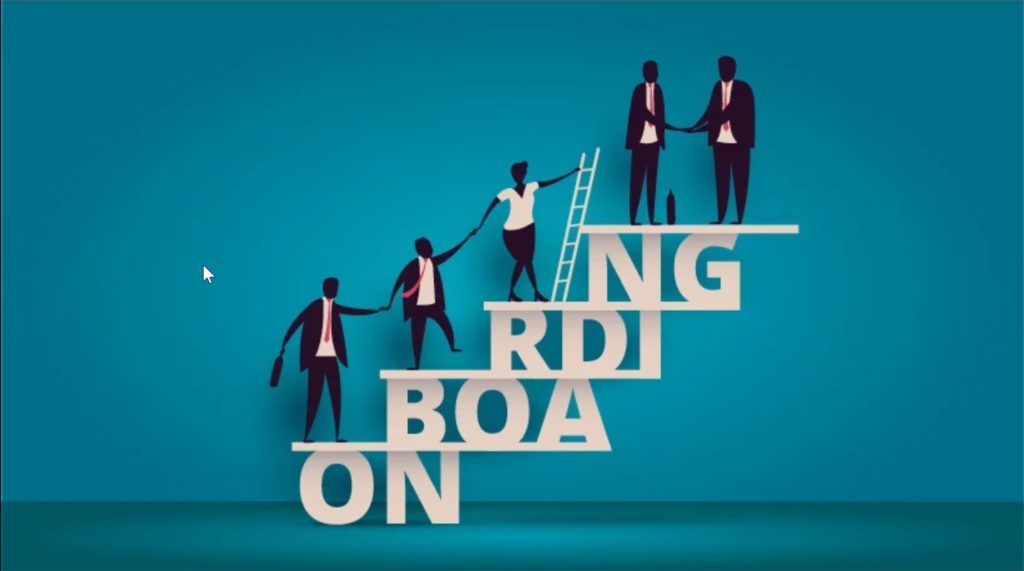Last Updated on December 13, 2024 by Owen McGab Enaohwo
Image Credit: Graf Vishenka/Shutterstock.com
HR finally found that great developer the company was looking for! Hurray! Now, how do we fully onboard that professional to our company? New hires can be difficult to manage the first few weeks, or a breeze to get that new teammate fully comfortable from week one. In this article, we will explore some of the most trendy and successful new hire tips.
Welcome Kit Box
This is both a welcome gift and a provision of tools the new hire will need to perform their job. The new hire welcome kit usually includes a company t-shirt, mugs, stickers, office toolsets like a notebook, sticky notes, and pens. Some companies get really creative and go the extra mile by giving headphones, a laptop, an ergonomic mouse, a hoodie, and some goodies.
LMS for Onboarding
LMS is short for Learning Management System. It is a training software companies use for their employees, customers, and even stakeholders. There are many platforms out there to choose from, from those that integrate with SalesForce to open source. These platforms help HR and team leaders to record training videos, upload reading documents and tests, and view the new hire’s progress during the onboarding training phase. A customized plan should be given to each employee according to their position. Next will be the testing phase.
Testing Phase
By this point, the person who is being trained has already been tested during the interview sessions. Now the team leader wants to determine the level of skill and knowledge of the new hire. What is usually found are some gaps in required skills and new strengths no one in the company previously had. Maybe someone is really good with new coding hacks but terrible with reporting.
Having gaps in skills is normal, but those should be identified quickly and trained properly. Some gaps will remain hidden until the employee encounters them in a task. The very first tasks should always be shadowed by a senior teammate so that person can guide the new hire through the gaps.
Company Culture Integration
Company culture is something that should not be left behind as many businesses suffer from internal employee conflict, which affects their performance and their closest teammates. Every company develops a culture that in general terms employees should identify themselves with.
Social games are a great way to bond everyone together. Have them solve problems not work-related and share some emotional satisfaction together. Virtual escape rooms and online family games are excellent for this purpose. Set aside at least one day a month with a few hours free for social interaction. HR can plan the social sessions ahead of time and mix the teams each next event so employees get to know everyone from the company. Stimulate participation with interesting prizes like a team lunch and Amazon gift cards. Real-life social plans are also a great option for teams that live in the same city, like a cinema day, or an escape to the countryside on a Friday.
Test and Re-Train Every Quarter
During the onboarding phase new hires usually give out their 100% while they secure the job, but once that’s obtained the acquisition of new skills and personal growth tends to slack in the comfort zone. It is always a good idea to test new skills every 4 months and add new training courses to a professional program to maintain a high-level performance, but make sure this does not stress out the team. Do not make it seem like a course that can be failed, so no grades. If a teammate is slacking with a new training program, assign a partner to help them out and walk them through the difficult parts. Completion over grading.
Expand their Growth Mindset
Skills are not all a new hire needs to become an amazing team player. HR should also focus on their growth mindset, a way of thinking that sees mistakes as opportunities for growth and takes ownership for the good and bad that happens with their team. A growth mindset can be triggered with books about the subject, podcasts, inspirational films, and even some recorded speaker talks. If there is a company psychologist, the onboarding process can include a 1 on 1 to discuss professional fears and develop a coaching program to work them out.
